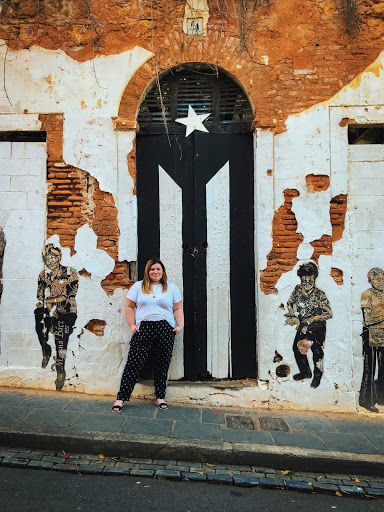A year later, Hurricane Maria still hits home for Kent State student
September 30, 2018
President Donald Trump tweeted Sept. 13 Puerto Rico “had anywhere from 6 to 18 deaths” during Hurricane Maria, but Alejandra Fishman Prats, a senior fashion merchandising major, challenges that account.
“It’s definitely false,” Fishman Prats said. “I could probably name more people that I know that passed away because of it.”
Fishman Prats lived in Guaynabo, Puerto Rico, between ages 4 and 17. She spent her weekends among the jagged green peaks of the Cordillera Central Mountains at her grandparents’ house or beach-hunting with her friends. On weekdays, she came to school early with her mother, a teacher.
Fishman Prats loved Puerto Rico, but when the time came for her to look for colleges, she knew she wanted to study fashion in the U.S. Kent State kept popping up in her search for good fashion schools, and after she visited, she decided to study fashion merchandising.
“I thought if I liked it in the winter, I would like it the rest of the year,” she said.
Meanwhile, Fishman Prats’ parents, brother and grandparents remained on the island, working and living as usual.
She was studying abroad in Florence when she heard news of Hurricane Maria’s impending arrival. However, she wasn’t very concerned because Hurricane Irma passed by a few weeks earlier and did far less damage to the island than expected.
Many on the island felt the same, and even though stores hadn’t yet been fully restocked, many thought what they already had for Irma would suffice.
When Maria escalated from a Category 1 to a Category 5 hurricane in just 24 hours, Fishman Prats grew concerned.
She was unable to communicate with her mother and grandparents for three days after Hurricane Maria made landfall.
“The last text I got from (my mother) was that a window was broken and water was coming in,” she said. “In that moment, your mind goes to the worst case scenario.”
She reached her brother and father quicker, but even the communication was intermittent, with telephone lines down in the streets and certain providers being less reliable than others.
Although physically unharmed, the storm caused economic and mental hardships for the family. Her brother’s home was on the first floor and sustained heavy flooding, while doors blew down in her grandparents’ house.
Fishman Prats went back to Puerto Rico in December and saw the devastation firsthand. Roads were unsafe because of debris, light poles were out and power was spotty, she said.
Her grandparents only regained power in April, and they were forced to spend $1,500 every two weeks on a generator. Their hot water didn’t work either, making cold showers a part of everyday life.
The school Fishman Prats’ mother taught at was closed for months. Like many others affected by Maria, her mother drained her savings account to stay afloat. Weeks later, her mother and brother left Puerto Rico for the States.
“My mom and my brother were lucky,” she said. “They found good jobs, and they’re stable now in Miami. So it’s been good for them, but they definitely hope that there’s a day when they can go back.”
Fishman Prats talks to anyone she can and takes to social media to raise awareness of the issues surrounding Maria and Puerto Rico. She hopes as one of nine full-time, out-of-state students from Puerto Rico at Kent State, conversation with those unfamiliar on the issues can be a productive first step.
“If it’s coming from a place of kindness, … then I will always be open to having those dialogues with people,” she said.
As a U.S. territory, Puerto Rico has slightly different representation in its government than the states. It doesn’t have a vote in Congress, nor can its citizens vote for the president. Because of these differences, Fishman Prats thinks disaster relief wasn’t taken seriously, especially compared with the response to Hurricane Florence.
Failures in disaster relief have been politicized since the hurricane first hit, as Trump and the mayor of San Juan, Carmen Yulin Cruz, exchanged criticisms. But Fishman Prats believes such a slow response to restore power and provide relief would have been unacceptable had Maria hit the continental U.S.
Fishman Prats doesn’t ask much, only that the average American takes all the media coverage of Maria as an opportunity to educate themselves.
“I don’t expect everyone to know our history, but I do expect people to know the basics of who we are,” she said. “We are not owned by the U.S.”
Madison Patterson is the International Students and Issues reporter. Contact her at [email protected].












